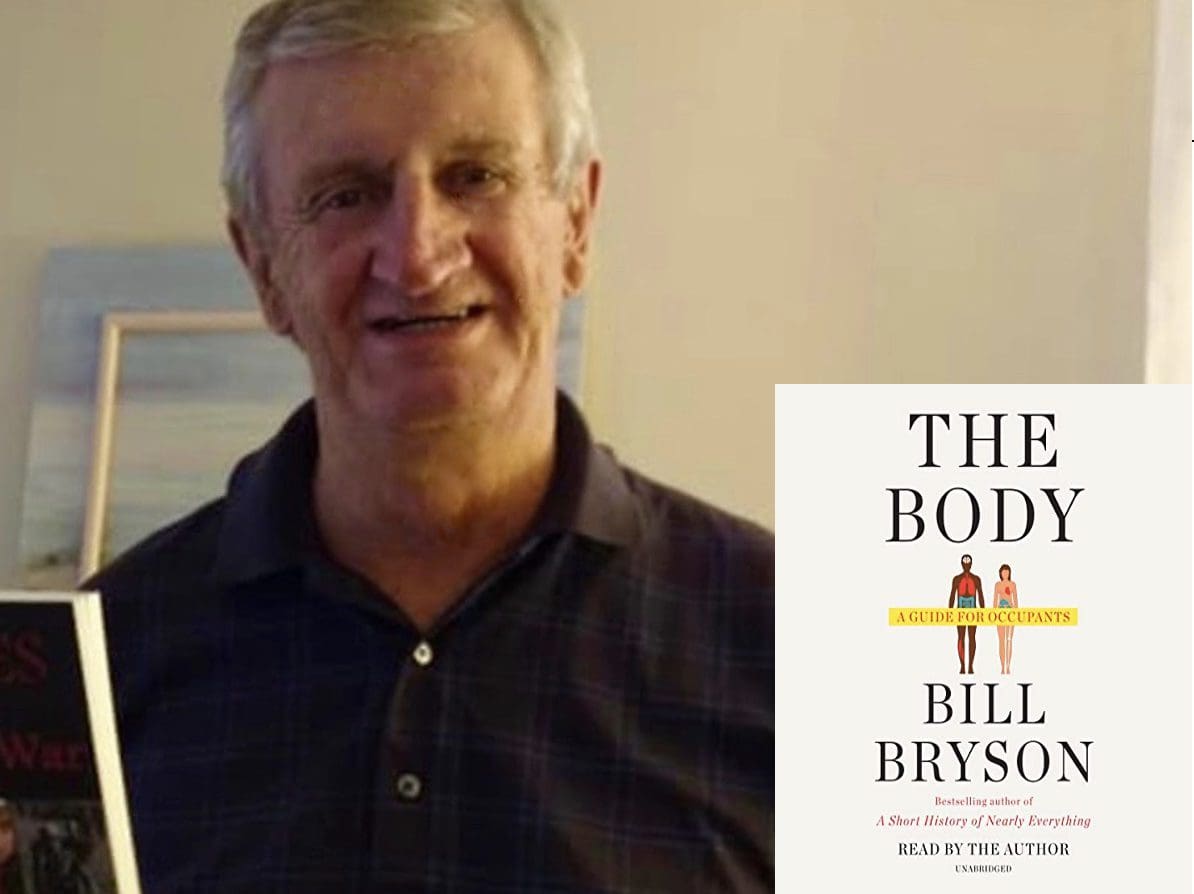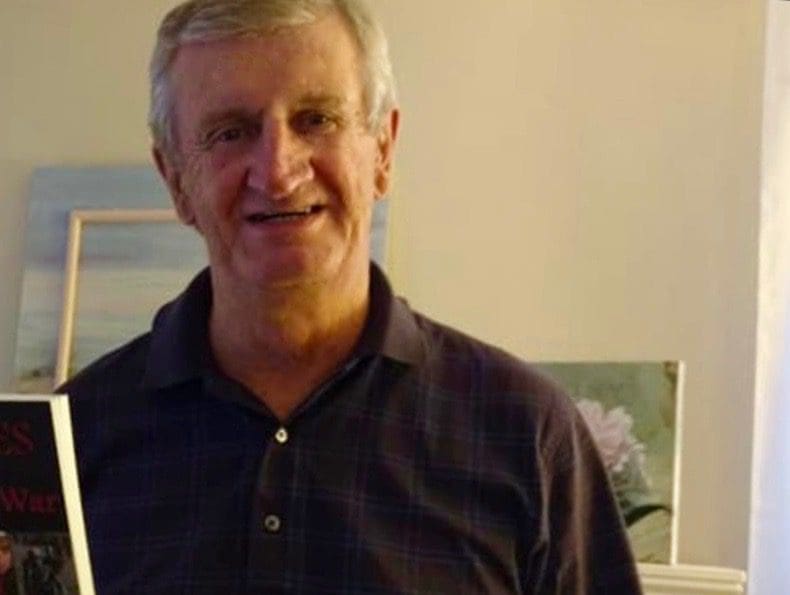Search Posts
Recent Posts
- Real Estate in RI: Seaside waterfront communities are all the rage. Who’s buying – Emilio DiSpirito June 6, 2025
- Outdoors in RI: 2A votes, Charter Yachts, active summer programs, garden tours, aquatic weeds… June 6, 2025
- All About Home Care, with two Rhode Island locations, closing after 22 years in business June 6, 2025
- GriefSPEAK: Angel wings with footprints – Mari Nardolillo Dias June 6, 2025
- Rhode Island Weather for June 6, 2025 – Jack Donnelly June 6, 2025
Categories
Subscribe!
Thanks for subscribing! Please check your email for further instructions.

The Body – A Guide for Occupants – by Bill Bryson – book review by Jim Raftus
by Jim Raftus, book reviewer
Bill Bryson, an expatriate American living in England since 1977, made his reputation, especially in the United States, as a travel writer. Nearly half of his 19 books, published starting in 1984, are travel related. They are intelligent, quirky and witty looks at locations such as Africa, England, Australia and America. Bryson is an astute, droll and often acerbic observer of the sights he encounters. Both praise and disdain are rendered with a wonderful supply of humor. His description of the dilemma faced by visitors to a museum in a remote Australian town when they receive a burdensome and heavy bag of travel brochures entering the facility is a typically hilarious insight. (In A Sunburned Country)
The publication in 2003 of A Short History of Nearly Everything came as a shock to happy readers of Bryson’s travel books. Weighing in at a hefty 548 pages, A Short History of Nearly Everything manages to live up to its audacious promise of covering nearly everything in the world of science. It displayed a talent and intellect even broader than what was perceivable in his well-received travel works.
Bryson’s latest effort, The Body – A Guide for Occupants, cements his reputation as so much more than a gifted travel writer. It’s as if Michelangelo had been hired to just paint the trim at the Sistine Chapel, then decided to take a shot at that ceiling.
In 23 chapters Bryson takes readers from the basics of how to build a human to the last gasps of life. In a sense, to Bryson, life is another journey. One he travels for 383 pages. Within this journey he dispenses wisdom, explodes myths, calls out frauds and lauds heroes in science and medicine.
Two overall themes for Bryson are simply the wonder of life and the complexity in the creation of the Homo sapiens species. He is generous in his praise of past and present scientist, doctors and researchers who dedicate their lives to sometimes arcane studies which may, or may not, lead to successful use in the medical field.
Amazing details and statistics are abundantly provided throughout the work:
It takes 7 Billion Billion Billion (7,000,000,000,000,000,000,000,000,000) atoms to make a human.
You blink 14,000 times a day, so while awake your eyes are still shut a total of 23 minutes.
The length of all your blood vessels stitched together would encircle the earth two times.
Who knew?
In a chapter titled, “Food, Glorious Food” we learn some interesting and alarming facts:
We eat approximately 60 tons of food in an average life span. This equals 60 small cars.
Heinz Ketchup has more sugar per unit volume than Coca-Cola.
Avocados contain 5 times more saturated fat than a small bag of chips.
A couple of caveats for certain potential readers. If you are squeamish you may want to skip some of Chapter 9, “In The Dissecting Room: The Skeleton”. The opening section where Bryson describes his visit to the dissecting room at the University of Nottingham Medical School could be unnerving to some.
Hypochondriacs may want to avoid The Body all together and certainly shouldn’t stand in line for tickets if it’s ever made into a movie! (Not going to happen.) Descriptions, with photographs, of some procedures such as lobotomies performed by a Walter Freeman are graphic and disturbing.
Bryson delves into not only medical quackery but also criminal activity by large pharmaceutical companies often enough to make a human head explode.
The author’s voluminous research for The Body is obvious. As in A Short History of Nearly Everything he takes complex, technical and obscure subjects and makes them understandable and interesting to the average layperson.
Among many awards, Bryson was made an honorary Officer of the Order of the British Empire (OBE) for his writing in 2006. A year later he was presented the James Joyce Award by the University of Dublin.
In October 2020, shortly after publication of The Body, Bryson, at the age of 68, announced his retirement from writing. While hedging his bets by saying he’s, “ …treating retirement as an experiment so far this year”, he also added, “ I have masses of grandchildren and I would love to spend more time with them just down on the floor.”
Wonderful for his grandchildren, a melancholy image for readers who will miss his words.
_____
Contact: jimraftus33@gmail.com
Read More: www.whorlofwords.com
_____

Jim Raftus retired from a 35 year career in marketing and sales in 2011.
Jim is a Veteran having served in the Army from 1968 to 1971. His primary posting was in Alaska. His Army days served as a chapter he wrote for local author Terry Nau’s book “Voices of the Vietnam War” published in 2019.Jim chronicles the guilt felt by many members of the military who served during Vietnam but were stationed elsewhere.
Jim’s work has also appeared in the Boston Globe, Providence Journal, New England Living Magazine and RINewstoday.com
Jim’s higher education journey was an often interrupted 11 year journey which included credits from Roger Williams University, University of Rhode Island and the University of Alaska before finally earning a Bachelor of Arts degree from Rhode Island College in 1975. Jim was awarded the Outstanding Creative Writing Award at the commencement.
Jim served as the Foxboro correspondent for the Attleboro Sun Chronicle in the late 1970’s.
He is a Rhode Island native and long time resident of Cumberland.
Contact: jimraftus33@gmail.com
Read more: www.whorlofwords.com

Thank you for this review, Jim.
Will be reading it.
After that maybe we can have a conversation.